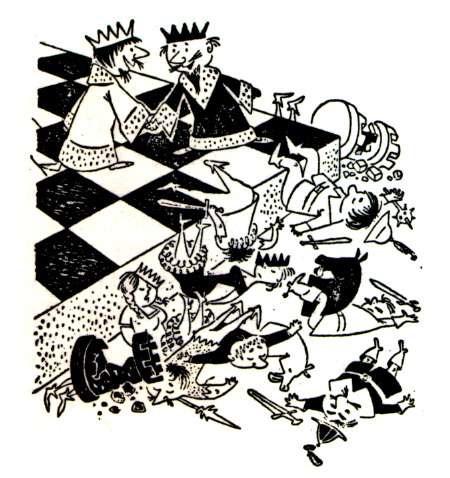A classical chess game (the type of game that International Masters and Grandmasters usually play) can last forever. Well, it can actually only last seven hours, but when you’re constantly calculating variations and thinking of lines that go five, six, seven moves deep it can certainly feel like forever. Every time your opponent moves, you have to reevaluate the position. Look for weaknesses, identify imbalances, formulate plans of attack and try to figure out your opponent’s plan of attack. Double, triple, quadruple check your move before you play it. It is exhausting. Now imagine you’re playing in a tournament. You’re doing that day in and day out for weeks, so yea, it certainly would seem tempting to agree to an early draw and save yourself from another couple hours of mental anguish, even if only for one day. Hell, I know I’d consider it. But to a chess fan, the draw, usually, is just plain boring. All it says to me is that two masters of the game reached a position that, according to modern day theory, is drawn, and neither of them wanted to challenge that theory. Neither of them had the guts or the energy to try something new.
I remember reading about a tournament recently where the arbiters tried to prevent early draws by not allowing any of the players to agree to a draw before their fortieth move. In one of the games, two Grandmasters played their first twenty-four moves and reached a well-analyzed position that was a theoretical draw. With sixteen moves left in the game, you’d expect to see some exciting chess. New ideas and new attacks being formulated. Modern chess theory being put to the test. But no. These two masters simply moved a piece back and forth for sixteen moves before shaking hands and calling it a tie. While a ridiculous example, this sort of short draw based on modern theory is not uncommon. In fact, even Bobby Fischer, one of the most outspoken proponents of banning short draws, was guilty of agreeing to draws early on. But Fischer would at least have the decency to make it entertaining when he did so. In one game, he reached a theoretically drawn position after nineteen moves. At the time, FIDE, the world’s preeminent chess federation, had banned any draws shorter than thirty moves. This was a rule that Fischer himself had lobbied strongly for, because he suspected the Russians were agreeing to short draws with each other in order to save their mental energy for their battles with him. When the arbiter told Bobby that he couldn’t agree to a draw for another eleven moves, Fischer simply pointed that “that rule is for the Communist cheaters, not for me.” And that was that. Fischer got his draw.
But most of the time, draws are just making chess boring. In the most recent World Championship match between Vishy Anand and Boris Gelfand, thirteen of the sixteen games ended in a draw. Thirteen. Out of sixteen. That’s pathetic. In the three weeks that this match lasted, only three games had a decisive result. Either the two contenders were so evenly matched that they allowed the other absolutely no opportunity for an advantage in those thirteen games, or they just weren’t willing to take risks with the stakes so high. Either way, the result was boring chess and a World Championship that became known as the “match forgotten around the world”.
I’m hopeful, though. There are top players out there that still play fighting chess. Carlsen, Kramnik, Aronian. These are guys who are always going for a win. A draw is a disappointment for them, and it’s what has made them the top players in the world. But mostly, I’m hopeful because the chess world recognizes the shadow that short draws have cast on the game. Fans are speaking out. Tournament directors are taking measures to prevent short draws, and sometimes eliminate them altogether. New scoring systems reward those willing to take risks and fight for a win, while resigning the complacent to obscurity. The chess world sees the draw as a weakness of the game, and we’ve begun to attack it.

No comments:
Post a Comment